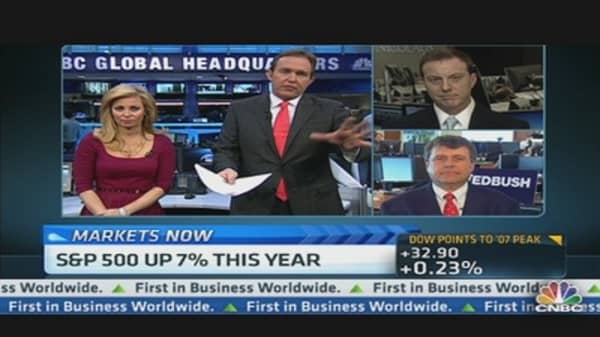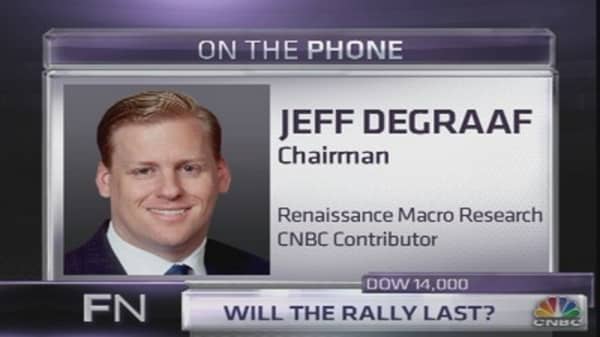"Everyone was waiting to buy the dip and when the dip began to disappear, everyone had to rush in…[psychologically,] people tend to run toward closing opportunities," said Art Cashin, director of floor operations at UBS Financial Services. "There are some technical signs of a broadening top, but at the same time, bulls can make the case that they're resting up."
On the economic front, the U.S. economy grew at a meager 0.1 percent rate in the fourth-quarter, according to the Commerce Department. The growth rate was the slowest since the first quarter of 2011.
Meanwhile, weekly jobless claims dropped 22,000 to a seasonally adjusted 344,000, according to the Labor Department, suggesting some improvement in the labor market. And the Chicago Purchasing Managers Index (PMI) of manufacturing activity rose to 56.8 in February. A reading above 50 indicates an expansion.
(Read More: History Suggests aGood Year for the Bulls)
Herbalife jumped after the nutrition and skin-care products company announced it will increase the size of its board of directors to add two representatives of activist investor Carl Icahn.
Facebook will acquire Atlas Solutions, an advertising technology business, from Microsoft in a deal valued around $100 million, sources told CNBC.
Among earnings, Sears posted quarterly earnings and revenue that exceeded Wall Street expectations, but shares slumped amid skepticism over the retailer's ability to turn itself around. Meanwhile, Kohl's slid after the mid-tier department store chain posted lower-than-expected earnings and forecast full-year profit that missed Wall Street estimates. The company also said it expects same-store sales to be between flat to up 2 percent this year.
JCPenney tumbled to lead the S&P 500 laggards after the retailer posted a much wider-than-expected loss and revenue that fell short of expectations. At least three brokerages cut their price target on the company.
Groupon plunged nearly 20 percent after the daily-deal website posted earnings that missed estimates and handed in current-quarter guidance that widely fell short of Wall Street projections. In addition, at least three brokerages slashed their rating on the company and Piper Jaffray lowered its price target to $7 from $8.
Gap and Salesforce.com are among notable companies slated to post earnings after the closing bell.
(Read More: Investor Birinyi Sees 20% Market Upside)





